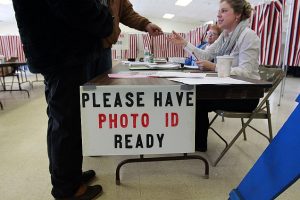At This Point, Texas Should Try Letting Brown People Vote
A federal judge just struck down a restrictive voter ID law in Texas -- with good reason.

(Photo by Suzanne Kreiter/The Boston Globe via Getty Images)
A federal judge struck down a restrictive voter ID law in Texas.
The Texas voter ID law has been controversial at every level since it was passed by the legislature in 2011, and it’s regarded as one of the most restrictive in the country. The black and brown population in Texas has been growing, and the legislature changed the voter ID rules to suppress the votes from that growing demographic.

Early Adopters Of Legal AI Gaining Competitive Edge In Marketplace
Of course, that’s not what the legislature says it did. “Voter fraud, is the familiar canard used to justify voter suppression by Republican legislatures all across the country.
But on Monday, United States District Judge Nelva Gonzales Ramos was having none of it. Judge Ramos found that Texas acted with intent to discriminate against blacks and Hispanics in the state.
Thing is, this is the second time Judge Ramos has had to tell Texas to stop being racist.
Last time, in 2014, Ramos found that the Texas plan was racist, and relied heavily on Texas’s history of discrimination. But Texas appealed to the Fifth Circuit Court of Appeals and the appellate court said Ramos shouldn’t have relied on Texas’s discriminatory history in her ruling.
Sponsored

The Business Case For AI At Your Law Firm


Early Adopters Of Legal AI Gaining Competitive Edge In Marketplace

Navigating Financial Success by Avoiding Common Pitfalls and Maximizing Firm Performance

The Business Case For AI At Your Law Firm

It’s worth noting that the 2014 case happened against the backdrop of John Roberts prematurely declaring racism over in the South and gutting the Voting Rights Act in Shelby County v. Holder. Ordinarily, Texas would have needed pre-clearance from the feds in order to change their voting laws. Because, you know, of the state’s HISTORY OF RACIAL DISCRIMINATION.
But sure, treating Southerners as more likely to be racist towards minority voters, just because they have in fact been more racist, seems unfair to people who just want to discriminate against minority voters.
This time, Judge Ramos focused on the actions of the state legislature. From the New York Times:
She wrote of considering “all available direct and circumstantial evidence of intent” rather than trying to “discern the motivations of particular legislators.” The judge highlighted attempts by Democrats to blunt the racial impact of the law, known as Senate Bill 14, through amendments that were ultimately rejected, including allowing additional types of photo identification. “Many categories of acceptable photo IDs permitted by other states were omitted from the Texas bill,” she wrote.
I imagine Texas will appeal because… well, if black and brown people actually vote, the Texas legislature won’t look the way it wants to. Census is coming up, baby.
Sponsored

Legal AI: 3 Steps Law Firms Should Take Now

Is The Future Of Law Distributed? Lessons From The Tech Adoption Curve
And who knows what the Fifth Circuit will do. Who knows what will happen if the case gets to the Supreme Court. There are a lot of white people who see voter ID laws as a key way to hang onto power as we hurtle towards being a majority-minority country.
If Texas keeps this up, they could be in a world of pain.
Everybody knows that John Roberts gutted the “coverage formula” for states that needed to seek pre-clearance for their voting laws. It’s section 4(b) of the Voting Rights Act that Roberts found unconstitutional. What still survives is Section 5, the actual pre-clearance requirement.
Since Shelby County, no state has been brought back under a pre-clearance requirement. But Texas literally seems like it’s asking for it. Note that Judge Ramos has found “intentional” discrimination; that might be enough to re-attach Texas to the standards set forth in Section 5. Texas is being so racist that they might have to get permission before doing anything else racist.
Of course, Roberts and his new pal Neil Gorsuch could rule that Section 5 is unconstitutional. And they might because they don’t have a history of actually caring whether black and brown people have access to the ballot box. This thing is far from over.
But I have a, perhaps, radical strategy to solve this issue. I’m not sure of the Republicans in the Texas legislature have thought of this, but instead of trying to suppress the votes of minorities, Republicans could attempt to earn those votes. Crazy talk, I know, but in my experience if you have policies that aren’t openly racist towards entire groups of people, those people are more likely to vote for you.
If the Republican strategy in Texas is to keep black and brown people from voting, forever, they’re going to lose. Demography doesn’t have to be destiny, but the Texas legislature seems hellbent on making it so. Now, they’re literally risking their ability to have local control over their own voting procedures.
Is that worth it when you could just not be racist and let people go vote? We should be in the business of making it easier for people to vote, not more difficult. If Texas Republicans embrace the concept that black and brown people have valid voices, they might be able to focus on the task of convincing them about Republican policies.
Long term, that’s the only real way forward.
Elie Mystal is an editor of Above the Law and the Legal Editor for More Perfect. He can be reached @ElieNYC on Twitter, or at elie@abovethelaw.com. He will resist.







